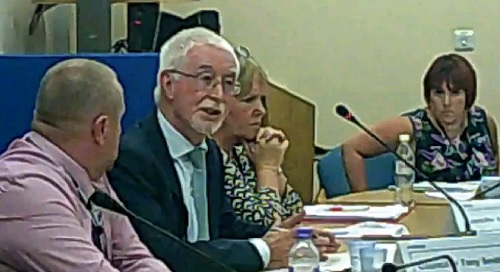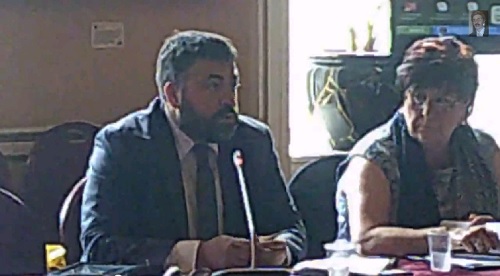Legal advice from Surjit Tour to 62 Wirral Council councillors on Lyndale School matter

Below this is a copy of the multi page legal advice written by Surjit Tour on the 11th July 2014 and distribute to all 62 councillors present at the Council meeting on 14th July 2014 on the Lyndale School motion.
This was provided (rather surprisingly to me as it must mark a change from the past towards more openness and transparency) in response to a Freedom of Information Act request of mine made on the 14th August 2014.
———————————————————————————————————————————————————————
ADVICE NOTE
PRE-DETERMINATION, PRE-DISPOSITION AND BIAS
COUNCIL MEETING – 14 July 2014
Notice of Motion – The Lyndale School
(Council Agenda Item 11 (ii))
-
Purpose
-
In view of the Notice of Motion relating to The Lyndale School being debated at Council on 14 July 2014, I have set out below some advice for your consideration in relation to the issues of ‘Pre-determination’, ‘Pre-disposition’ and ‘Bias’ given the significance and high profile nature of this particular subject matter.
-
This Note is intended as guidance only and provided to help you in your consideration of these issues in the context of The Lyndale School Notice of Motion arising at Council on 14 July and thereafter.
-
Pre-determination and Pre-disposition
-
Pre-determination is defined as:
“occurring when a Member has fixed views on a matter and retains a closed mind when it comes to making a determination”.
-
Pre-disposition is defined as:
“a Member being open to the possibility that, however unlikely, they will hear argument during the debate about the issue that will change their mind about how they intend to vote. As long as they are willing to keep an open mind about the issue they are entitled to take part in any vote on it”.
-
In National Assembly for Wales v Condron and another [2006], the court recognised that there is a two stage test for pre-determination:
First – the behaviour complained of has to be relevant to the issue.
Second – the situation has to be one where a notional fair-minded and well-informed observer, looking objectively at all circumstances, would consider that there is a real risk that the decision maker has refused even to consider a relevant argument or would refuse to consider a new argument.
-
In summary, there are no restrictions on a Member holding a provisional view on an issue (pre-disposition) but there is a problem if he/she acts with a closed mind on a subject (pre-determination).
-
The pre-disposition can be strong and can be publicly voiced. It might be in favour of or against a particular point. The expressing of an intention to vote in a particular way before a meeting (pre-determination) is not the same as when a Member makes it clear he/she is willing to listen to views of all sides before deciding on how to vote (pre-disposition).
-
Pre-disposition in decision making is fine.
-
Whereas, decisions made by Members later judged to have pre-determined views have been quashed by way of judicial review.
-
Bias
-
Bias is defined as:
‘a particular tendency or inclination, especially one that prevents impartial consideration of a question; prejudice’.
-
The test is outlined in the case of Porter v. Magill [2001] where Lord Hope said that:
‘…the question is whether the fair minded and informed observer, having considered the facts would conclude that there was a real possibility that the tribunal was biased.’
-
It is therefore important that each Member considers his/her stance from the position of a ‘reasonable onlooker’ and decides whether there would be or could be the appearance of bias.
-
Only you can say whether you are biased or not.
-
Localism Act 2012
-
Section 25 of the Localism Act states that a Member should not be regarded as having a closed mind simply because he/she has previously said/or acted in a way that may have directly or indirectly indicated the view he/she may take in relation to a matter.
-
Section 25 does not attempt to change case law in respect of pre-determination and bias, but it has attempted to clarify it.
-
The section applies if there is an issue about the validity of a decision, as a result of an “allegation of bias or pre-determination”, or “otherwise” and it is relevant to that issue whether the decision maker, or any of the decision makers, had or appeared to have had a closed mind (to any extent) when making the decision. Thus it is drafted so as to catch as many cases as possible in which an allegation of pre-determination might be made which might affect the validity of a decision.
-
Section 25 catches allegations of actual, and apparent, pre-determination (however tenuous).
-
The provision is also widely phrased in another sense. It applies to views not just about the subject matter of the decision in question, but to anything a Member has done which might show, directly, or indirectly, what view he/she takes, or would take, or might take, about any matter which is relevant to the decision.
-
The explanatory notes to the Localism Act 2011 in relation to section 25 state that ‘Predetermination occurs where someone has a closed mind, with the effect that they are unable to apply their judgement fully and properly to an issue requiring a decision.
-
Section 25 is set out on pages 4 and 5 below for your reference.
5. Summary
-
In summary, Members are asked to consider the above advice when considering all items of Council business requiring Members to make a decision; however particularly so in relation to the Notice of Motion re: The Lyndale School.
-
Members are aware that no firm/final decision has been taken by the Administration in relation to The Lyndale School and therefore the Council’s Executive decision making arrangements have yet to be administered and concluded. These arrangements also include options that are still relevant to non-executive Members and accordingly you are advised to consider the implications/impact of pre-determination, pre-disposition and bias on the decision making arrangements relevant to this subject matter.
If you have any queries concerning this matter, please do not hesitate to contact me.
Kind regards
Surjit Tour
Head of Legal & Member Services
and Monitoring Officer
11 July 2014
LOCALISM ACT 2011
Section 25
(1) Subsection (2) applies if—
(a) as a result of an allegation of bias or predetermination, or otherwise, there is an issue about the validity of a decision of a relevant authority, and
(b) it is relevant to that issue whether the decision-maker, or any of the decision-makers, had or appeared to have had a closed mind (to any extent) when making the decision.
(2) A decision-maker is not to be taken to have had, or to have appeared to have had, a closed mind when making the decision just because—
(a) the decision-maker had previously done anything that directly or indirectly indicated what view the decision-maker took, or would or might take, in relation to a matter, and
(b) the matter was relevant to the decision.
(3) Subsection (2) applies in relation to a decision-maker only if that decision-maker—
(a) is a member (whether elected or not) of the relevant authority, or
(b) is a co-opted member of that authority.
(4) In this section—
“co-opted member”, in relation to a relevant authority, means a person who is not a member of the authority but who—
(a) is a member of any committee or sub-committee of the authority, or
(b) is a member of, and represents the authority on, any joint committee or joint sub-committee of the authority, and who is entitled to vote on any question which falls to be decided a any meeting of the committee or sub-committee;
“decision”, in relation to a relevant authority, means a decision made in discharging functions of the authority, functions of the authority’s executive, functions of a committee of the authority or functions of an officer of the authority (including decisions made in the discharge of any of those functions otherwise than by the person to whom the function was originally given);
“elected mayor” has the meaning given by section 9H or 39 of the Local Government Act 2000;
“member”—
(a) in relation to the Greater London Authority, means the Mayor of London or a London Assembly member, and
(b) in relation to a county council, district council, county borough council or London borough council, includes an elected mayor of the council;
“relevant authority” means—
(a) a county council,
(b) a district council,
(c) a county borough council,
(d) a London borough council,
(e) the Common Council of the City of London,
(f) the Greater London Authority,
(g) a National Park authority,
(h) the Broads Authority,
(i) the Council of the Isles of Scilly,
(j) a parish council, or
(k) a community council.
If you click on any of these buttons below, you’ll be doing me a favour by sharing this article with other people. Thanks:



